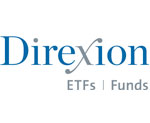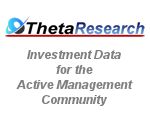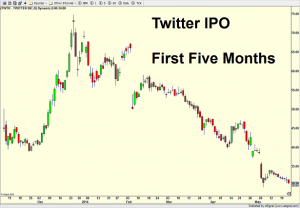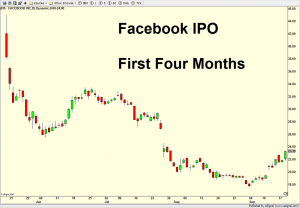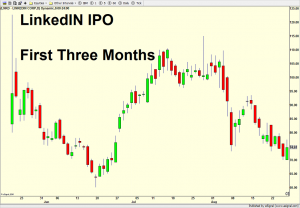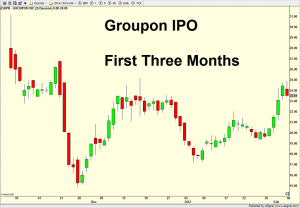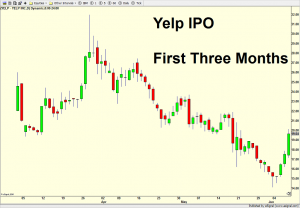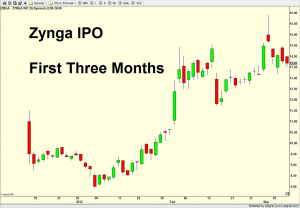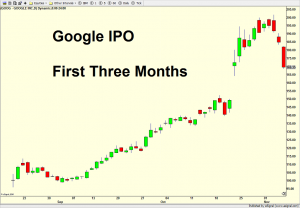“Hot” IPOs like Alibaba, Twitter and Facebook are usually very emotional, much anticipated and huge financial media events. As I have discussed over and over, emotion in investing can have a very detrimental impact on your portfolio! I went back and found similar, much anticipated, “hot” IPOs to show you what transpired over the coming few months. The results should not be surprising.
Twitter really bucked the trend over the past few years. While it initially dropped 20% from its $50 first day high, that set off a very powerful rally of almost 100% to $75 before seeing the customary 60% IPO collapse to $30. End result: investors were mostly better off waiting than buying right away.
Facebook had all kinds of problems right out of the gate and you are welcome to search the archives on the blog for my very opinionated view. As you can see, it was almost straight downhill for four months before THE bottom was hit. End result: investors were absolutely better off waiting than buying right away.
LinkedIN is next and similar to Facebook, there was immediate and significant weakness before a good low was seen. End result: It was basically a toss up.
Just like with LinkedIN, Groupon experienced the ole buyer’s remorse right from the start with the first meaningful trough coming about a month later. End result: investors were better off waiting than buying right away.
Yelp bucked the trend somewhat with only a shallow initial pullback, but the stock didn’t escape the carnage as you can over the first three months. End result: investors were better off waiting than buying right away.
Zynga was just like the others with an immediate month long decline to a good trading low. End result: investors were better off buying sooner than later.
Google is below and this is certainly not a social media company like the others. But at the time, it was an incredibly hot IPO. It was also during a very different investing climate back in 2005 with vastly different results. It does not belong in the group above, but I figured I would answer the question before it was asked. End result: investors were rewarded almost immediately.
The moral of the story is that most times, investors are rewarded by having patience with hot IPOs. Personally, I would rather be late and pay up than be early and lose a lot of money.

Paul Schatz
Paul Schatz is President and Chief Investment Officer of Heritage Capital, LLC, in Woodbridge, CT. Paul developed and manages all eight of the firm’s currently offered investment programs.
Editor’s Note: Be sure to check out Paul’s Blog: Invest For Tomorrow
The opinions and forecasts expressed herein are those of Mr. Paul Schatz and may not actually come to pass. Mr. Schatz’s opinions and viewpoints regarding the future of the markets should not be construed as recommendations. The analysis and information in this report is for informational purposes only. No part of the material presented in this report is intended as an investment recommendation or investment advice. Neither the information nor any opinion expressed nor any Portfolio constitutes a solicitation to purchase or sell securities or any investment program.
Any investment decisions must in all cases be made by the reader or by his or her investment adviser. Do NOT ever purchase any security without doing sufficient research. There is no guarantee that the investment objectives outlined will actually come to pass. All opinions expressed herein are subject to change without notice. Neither the editor, employees, nor any of their affiliates shall have any liability for any loss sustained by anyone who has relied on the information provided.
The analysis provided is based on both technical and fundamental research and is provided “as is” without warranty of any kind, either expressed or implied. Although the information contained is derived from sources which are believed to be reliable, they cannot be guaranteed.
Investments in equities carry an inherent element of risk including the potential for significant loss of principal. Past performance is not an indication of future results.


